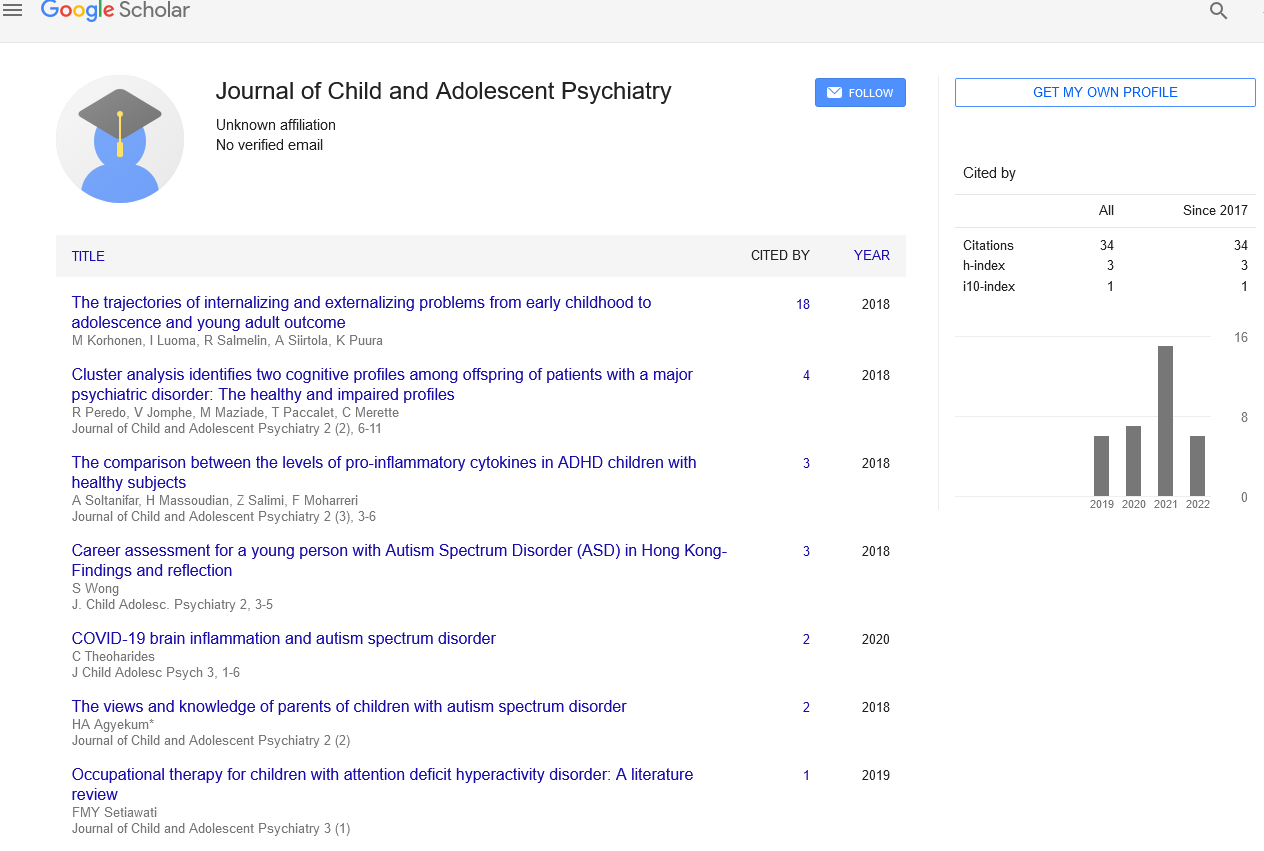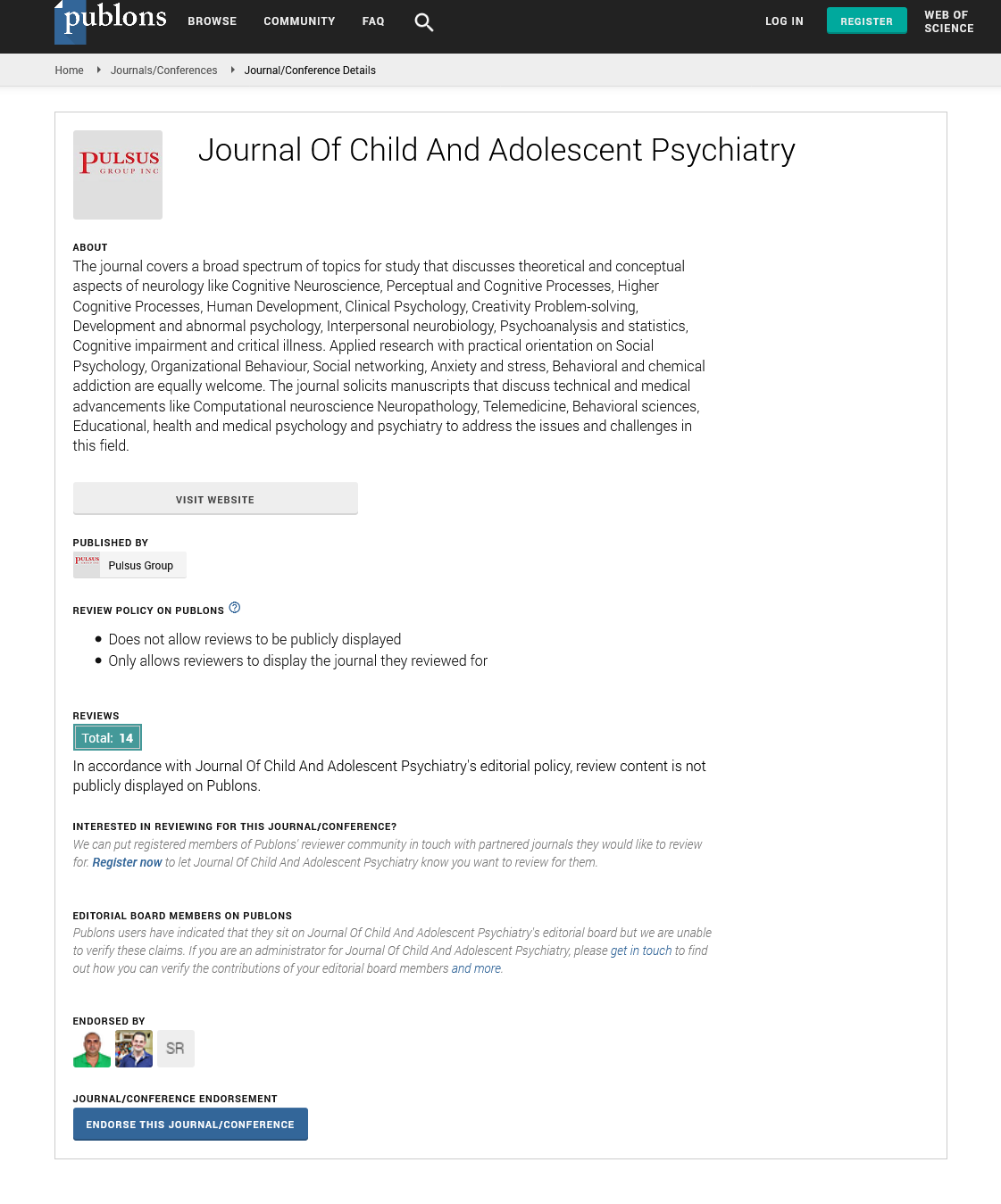Olanzapine in the treatment of avoidant and restrictive food intake disorder: A case report
Received: 24-May-2021 Accepted Date: Jun 07, 2021; Published: 14-Jun-2021
Citation: Dinesh S, Jyotsana P, Shah O, Donnelly C. Olanzapine in the treatment ofavoidant and restrictive food intake disorder: A case report. Child Adolesc Psych 2021;5(3):1-4.
This open-access article is distributed under the terms of the Creative Commons Attribution Non-Commercial License (CC BY-NC) (http://creativecommons.org/licenses/by-nc/4.0/), which permits reuse, distribution and reproduction of the article, provided that the original work is properly cited and the reuse is restricted to noncommercial purposes. For commercial reuse, contact reprints@pulsus.com
Abstract
The treatment of Avoidant Restrictive Food Intake Disorder (ARFID) is primarily based on behavioral intervention and no high-quality evidence exists supporting efficacy of medications. However, low quality evidence in previous retrospective and case studies indicate possible benefits of Olanzapine. We present a nine-year old female with ARFID who presented to the inpatient pediatric unit twice with severe food refusal leading to severe metabolic abnormalities. Addition of Olanzapine to Fluoxetine, and behavioral intervention not only resulted in significant improvement in feeding within few days but also reduced the length of hospitalization. Large randomized controlled trials are suggested to derive conclusive results.
Keywords
ARFID; Olanzapine; Eating disorder; Fluoxetine
Introduction
Avoidant/restrictive food intake disorder (ARFID) is an eating disorder (new in DSM-V) manifested by persistent failure to meet appropriate nutritional/energy requirements associated with one or more of the following:(a) significant weight loss or failure to achieve expected weight gain, (b) significant nutritional deficiency, (c) dependence on enteral feeding or oral nutritional supplements, or, (d) marked interference with psychosocial functioning [1]. The distinguishing features of ARFID versus anorexia nervosa (AN) or bulimia nervosa (BN) is the absence of abnormal perception of one’s body image or weight and compensatory mechanism like binging or purging to reduce weight [1]. Currently, there is no FDA approved medication and the management relies primarily on behavioral intervention. Olanzapine (OLZ), an atypical antipsychotic, is well known to stimulate appetite and increase weight [2]. Previous literature evidences including a review of randomized controlled trials have indicated that the low dose OLZ could be beneficial as an adjunct pharmacological treatment of Anorexia Nervosa (AN)as it helped with serotonergic and dopaminergic dysfunction present in AN [3,4]. However, scarce evidence exists demonstrating the role of OLZ for the treatment of ARFID and these are based on small retrospective studies and case series [5,6]. The objective of our paper is to present a case of a 9-year old girl with severe ARFID who improved drastically after starting OLZ.
Case Presentation
A 9 year old female patient with a history significant for aversive experience of severe abdominal pain of appendicitis (requiring surgery) that started after eating food and subsequently developed feeding refusal leading to severe metabolic abnormalities. She required in patient admission for two months (2018) in a tertiary hospital at Boston, USA where she was diagnosed with ARFID, received nasogastric tube feeding, family-based intervention, behavioral therapy, and Fluoxetine 20 mg daily. After discharge from hospital, she continued outpatient therapy and Fluoxetine for one year and was consuming normal amounts of calories. Unfortunately, her feeding started to deteriorate gradually again triggered by a choking incident while drinking water during a family camping trip which resulted in complete refusal of food or drink orally. She was eventually brought to the Dartmouth Hitchcock Medical Center (DHMC) Emergency Department (ED) secondary to extreme lethargy and was found to have severe metabolic abnormalities with acidosis (pH 7.1, anion Gap 18, Potassium 2.9) requiring admission to the intensive care unit. She was treated with fluid and electrolyte replacement and was medically stabilized by the pediatric team. On evaluation by child and adolescent psychiatry team, her mental status exam was found to be significant for nonspontaneous speech, selective mutism, poor judgment, and poor insight. She appeared malnourished, shy and anxious with constricted affect, preoccupied with worried thought/phobia related to eating, almost to a delusional quality. She was diagnosed with ARFID, separation anxiety disorder, and selective mutism and was recommended to restart Fluoxetine which was increased up to 15 mg/day. Cyproheptadine (CYP) 2 mg HS was added on discharge for stimulating appetite but patient could not tolerate due to excessive daytime sedation. She was readmitted after 2 days, medically stabilized, and was started on OLZ 1.25 mg at bed time with improvement in sleep and started to eat after the 2nd day of the admission. OLZ was increased to 2.5 mg daily at bedtime day 4 and Fluoxetine was increased to 20 mg daily. An interdisciplinary team meeting was held with nutritionist, pediatrics, social worker, and child psychiatry and age appropriate dietary/behavioral treatment plan was instituted. Patient showed significant improvement in about one-week, started to eat adequately, and was discharged home with recommendations of OLZ and Fluoxetine, and close follows up with her medical doctor, psychiatrist, therapist, and dietician (Table 1).
| Author, Year, Country | Age/Sex | Design of study |
Diagnosis | Setting | Medications |
Other intervention |
Conclusion |
|---|---|---|---|---|---|---|---|
| Brewerton et al., 2017, USA | 9-19 yrs/ F (8), M (1) | RS (N=9) | ARFID | Inpatient Outpatient | OLZ (0.625 mg-2.5 mg/day) | Individual therapy, FT, BT | Adjunct OLZ was beneficial for weight gain, anxiety, depression and cognition |
| Spettigue et al., 2018, Canada | 12.5 yrs/F | Case series 1 | ARFID/Mild phobia | Inpatient | OLZ 2.5 mg FLX |
CBT, FT | OLZ helped gain weight gain |
| 10.9 yrs /F | Case series 2 | ARFID | Inpatient | OlZ 2.5 mg FLX |
CBT, FT | OLZ helped with severe anxiety and gain weight | |
| 13.1 yrs/M | Case series 3 | ARFID | Inpatient | FLX 10-40 mg, OLZ | CBT, FT | OLZ decreased anxiety and helped gain weight | |
| 14.4 yrs/F | Case series 4 | ARFID | Inpatient | OLZ, FLV | CBT, FT | OLZ helped weight gain | |
| Twins 12.9 yrs/F | Case series 5,6 | ARFID | Inpatient | OLZ, CYP, FLX | CBT, FT | OLZ helped gain weight, sleep and anxiety |
Abbreviations: ARFID: Avoidant Restrictive Food Intake Disorder; BT: Behavioral Therapy; CBT: Cognitive Behavioral Therapy; ED: Eating Disorder; F: Female; FBT: Family Based Treatment; FLV: Fluvoxamine; FLX: Fluoxetine; FT: Family Therapy; M: Male; OLZ: Olanzapine; RS: Retrospective Study; yrs: years
Table 1 : Summary of evidence for Olanzapine treatment
Discussion
The symptoms of feeding refusal in ARFID are usually preceded by aversive experiences (choking, pain, infection) related to feeding [6-8]. Consistent with the previous literature, our case also had a history of abdominal pain secondary to appendicitis which started after eating food. These aversive events likely lead to aversive conditioning amplified with cognitive distortions and preoccupations about the link of eating with pain, often at times to the point of being delusional, and hence the individual starts to restrict the food. The goals of treatment of ARFID, like other eating disorders, are to restore feeding and body weight, treat comorbid psychiatric and medical illness, formulate an eating behavioral plan, and educate the patient/family. Cognitive behavioral therapy (CBT) and family-based intervention (FBT) are the widely used psychotherapeutic approaches in the treatment of eating disorders [6]. A systematic review and meta-analysis indicated that FBT had better remission rates compared to the usual treatment for eating disorders [9]. CBT programs, such as exposure and behavioral experiments are powerful techniques for reducing anxiety and catastrophic thinking [10].
No randomized controlled trials have been conducted to date to prove the definitive effectiveness of medication in the treatment of ARFID. Selective Serotonin Reuptake Inhibitor (SSRI) takes longer duration to show its effects and it has controversial evidences in patient with low body weight due to reduced number of serotonin receptors. A retrospective study demonstrated that adjunct use of OLZ not only facilitated feeding and helped gain weight but also reduced anxiety, depressive, and cognitive symptoms [5]. It can be particularly helpful in patients with severely distorted cognition where patients might have delusional preoccupation about feeding. The effective dose range in previous literature was 0.625-2.5 which was consistent with the dose used in our case (2.5 mg/day). No evidence exists for better efficacy at higher doses. Similarly, potentially beneficial effects of OLZ in the treatment of ARFID have been evidenced in a case series of five patients (aged 10-14 years) who were treated in inpatient settings with adjunct OLZ in addition to CBT, FT and SSRI [6]. However, careful monitoring of side effects including sedation, metabolic abnormalities and movement disorders is utmost importance while treating patients with OLZ.
Conclusion
We conclude that the OLZ could potentially be a promising medication option, in addition to the behavioral /cognitive intervention in the treatment of ARFID. However, large randomized controlled trials are needed to derive conclusive results.
REFERENCES
- DSM-V. Diagnostic and statistical manual of mental disorders: DSM-5™, 5th ed. 2013.
- Brigham KS, Manzo LD, Eddy KT, et al. Evaluation and Treatment of Avoidant/Restrictive Food Intake Disorder (ARFID) in Adolescents. CurrPediatr Rep. 2018;6:107-113.
- Bosanac P, Norman T, Burrows G, et al. Serotonergic and Dopaminergic Systems in Anorexia Nervosa: A Role for Atypical Antipsychotics?. AUST NZ J PSYCHIAT. 2005;39:146-153.
- Brewerton TD. Antipsychotic agents in the treatment of anorexia nervosa: neuropsychopharmacologic rationale and evidence from controlled trials. Curr Psychiatry Rep. 2012;14:398-405.
- Brewerton TD, D’ Agostino M. Adjunctive Use of Olanzapine in the Treatment of Avoidant Restrictive Food Intake Disorder in Children and Adolescents in an Eating Disorders Program. J Child AdolescPsychopharmacol. 2017;27:920-922
- Spettigue W, Norris ML, Santos A, Obeid N. Treatment of children and adolescents with avoidant/restrictive food intake disorder: a case series examining the feasibility of family therapy and adjunctive treatments. J Eat Disord. 2018;6:20.
- Banerjee SP, Bhandari RP, Rosenberg DR. Use of low-dose selective serotonin reuptake inhibitors for severe, refractory choking phobia in childhood. J Dev BehavPediatr. 2005;26:123-127.
- ColakSivri R, HizarciogluGulsen H, Yilmaz A. Phagophobia Successfully Treated With Low-Dose Aripiprazole in an Adolescent: A Case Report. ClinNeuropharmacol. ClinNeuropharmacol. 2018;41:148-150.
- Couturier J, Kimber M, Szatmari P. Efficacy of family-based treatment for adolescents with eating disorders: a systematic review and meta-analysis. Int J Eat Disord. 2013;46:3-11.
- Thomas JJ, Wons O, Eddy K. Cognitive-behavioral treatment of avoidant/restrictive food intake disorder. CurrOpin Psychiatry. 2018;31:425-430.






